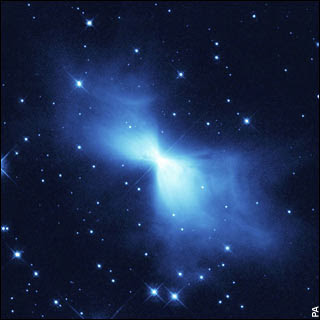 Forget about the threat that mankind poses to the Earth: our activities may be shortening the life of the universe too.The startling claim is made by a pair of American cosmologists investigating the consequences for the cosmos of quantum theory, the most successful theory we have. Over the past few years, cosmologists have taken this powerful theory of what happens at the level of subatomic particles and tried to extend it to understand the universe, since it began in the subatomic realm during the Big Bang.But there is an odd feature of the theory that philosophers and scientists still argue about. In a nutshell, the theory suggests that we change things simply by looking at them and theorists have puzzled over the implications for years.They often illustrate their concerns about what the theory means with mind-boggling experiments, notably Schrodinger's cat in which, thanks to a fancy experimental set up, the moggy is both alive and dead until someone decides to look, when it either carries on living, or dies. That is, by one interpretation (by another, the universe splits into two, one with a live cat and one with a dead one.) New Scientist reports a worrying new variant as the cosmologists claim that astronomers may have accidentally nudged the universe closer to its death by observing dark energy, a mysterious anti gravity force which is thought to be speeding up the expansion of the cosmos.The damaging allegations are made by Profs Lawrence Krauss of Case Western Reserve University in Cleveland, Ohio, and James Dent of Vanderbilt University, Nashville, who suggest that by making this observation in 1998 we may have caused the cosmos to revert to an earlier state when it was more likely to end. "Incredible as it seems, our detection of the dark energy may have reduced the life-expectancy of the universe," Prof Krauss tells New Scientist.The team came to this depressing conclusion by calculating how the energy state of our universe - a kind of summation of all its particles and all their energies - has evolved since the big bang of creation 13.7 billion years ago.Some mathematical theories suggest that, in the very beginning, there was a void that possessed energy but was devoid of substance. Then the void changed, converting energy into the hot matter of the big bang. But the team suggests that the void did not convert as much energy to matter as it could, retaining some, in the form of what we now call dark energy, which now accelerates the expansion of the cosmos.Like the decay of a radioactive atom, such shifts in energy state happen at random and it is possible that this could trigger a new big bang. The good news is that theory suggests that the universe should remain in its current state.
Forget about the threat that mankind poses to the Earth: our activities may be shortening the life of the universe too.The startling claim is made by a pair of American cosmologists investigating the consequences for the cosmos of quantum theory, the most successful theory we have. Over the past few years, cosmologists have taken this powerful theory of what happens at the level of subatomic particles and tried to extend it to understand the universe, since it began in the subatomic realm during the Big Bang.But there is an odd feature of the theory that philosophers and scientists still argue about. In a nutshell, the theory suggests that we change things simply by looking at them and theorists have puzzled over the implications for years.They often illustrate their concerns about what the theory means with mind-boggling experiments, notably Schrodinger's cat in which, thanks to a fancy experimental set up, the moggy is both alive and dead until someone decides to look, when it either carries on living, or dies. That is, by one interpretation (by another, the universe splits into two, one with a live cat and one with a dead one.) New Scientist reports a worrying new variant as the cosmologists claim that astronomers may have accidentally nudged the universe closer to its death by observing dark energy, a mysterious anti gravity force which is thought to be speeding up the expansion of the cosmos.The damaging allegations are made by Profs Lawrence Krauss of Case Western Reserve University in Cleveland, Ohio, and James Dent of Vanderbilt University, Nashville, who suggest that by making this observation in 1998 we may have caused the cosmos to revert to an earlier state when it was more likely to end. "Incredible as it seems, our detection of the dark energy may have reduced the life-expectancy of the universe," Prof Krauss tells New Scientist.The team came to this depressing conclusion by calculating how the energy state of our universe - a kind of summation of all its particles and all their energies - has evolved since the big bang of creation 13.7 billion years ago.Some mathematical theories suggest that, in the very beginning, there was a void that possessed energy but was devoid of substance. Then the void changed, converting energy into the hot matter of the big bang. But the team suggests that the void did not convert as much energy to matter as it could, retaining some, in the form of what we now call dark energy, which now accelerates the expansion of the cosmos.Like the decay of a radioactive atom, such shifts in energy state happen at random and it is possible that this could trigger a new big bang. The good news is that theory suggests that the universe should remain in its current state.To read more go to:
As in the days of Noah....






















































































.bmp)

























.bmp)